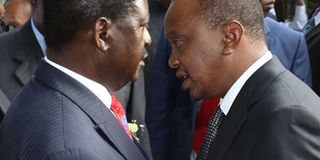Leaders, stop the rhetoric, unite Kenyans

President Uhuru Kenyatta (right) and Nasa leader Raila Odinga. FILE PHOTO | NATION MEDIA GROUP
What you need to know:
- On political processes, most of us have killed individual and collective conscience.
- We make questionable decisions and take morally unsound actions on matters that affect our lives.
- Following the 2017 elections, there is a wind of hatred between tribes that is slowly creeping into the national psych.
God must be favourably looking at Kenya. We somehow manage to hold together amid political storms of our own making. We are a little bit like spoilt children. How is this?
We lack political conscience. On political processes, most of us have killed individual and collective conscience. We make questionable decisions and take morally unsound actions on matters that affect our lives.
Quick examples: People who die on our roads every year without sustainable mitigation initiatives, elected leaders with questionable backgrounds and the rate at which we destroy our environment without worrying about our children’s future.
Human beings are moral beings. We make decisions based on the choices we make in our everyday life. No one makes decisions that are self-destructing. Even the person who commits suicide mistakenly chooses that self-extermination is for self-good.
FULFILMENT
In other words, every being wants the best for personal fulfilment. But what and who determines what is best for self fulfilment? It is the conscience, which determines what is best for self and for others.
In the recent past, we have read and heard in the media how the international community is supporting mediation between Jubilee (the government) and Nasa (aiming to be the government). That is great. The good neighbours have gathered around a family that is not conscious of its self-exterminating actions.
This is shameful, given how we pander into our sovereignty when its serves our interests.
Our primary interest at this point is to demonstrate that we are capable of solving our political differences with a great degree of sincerity, integrity and respect to human life.
While one may argue that politicians are representatives of the poor, the deadly political party primaries, chaotic election campaigns, brutal attacks on demonstrators and hardline positions taken by political antagonists point to the absence of anyone fronting the interests of the poor.
SOOTHING
The continuous soothing of the poor that all is well without meaningful engagement at the national level to ease political tension is a deception that will hurt future generations.
Another example of how we have killed our individual and collective conscience is, every election — perhaps with the exception of 2002 — we lose lives. A life lost to political campaigns is one too many. Interestingly, one would expect a national uproar over deaths to innocent people but we are often too afraid, too timid, to stand out and condemn the perpetrators.
Moreover, following the 2017 elections, there is a wind of hatred between tribes that is slowly creeping into the national psych. We only talk about it in hushed voices. We are divided, and denial of that is a disservice to ourselves.
On one hand is a group that wants to enjoy their presidency. They are pained that they cannot be left to celebrate their victory.
ANGER
They look at themselves as victims of misplaced anger. On the other are angry voters who, justifiably or not, feel they were denied victory. They feel they are victims of a manipulated electoral system. Between these two groups, the common factor is victimisation.
It is not possible that a process can be responsible for producing extreme emotions of deadly hate. We have to be true to ourselves, tap into our conscience and point out — not just legally for God’s sake — the truth deep within us on why we want to destroy the future of our children by living in denial of our unconscientious ways of self-governance.
We owe the future generation a united nation. We must be a nation with a conscience.
Dr Mokua (PhD) is the executive director, Jesuit Hakimani Centre. [email protected].




